Social Welfare
India’s Largest Tribal Village Development Scheme
Pradhan Mantri Janjatiya Unnat Gram Abhiyan
Posted On:
22 JUL 2025 9:44AM
Key Takeaways
- PM JUGA, launched on October 2, 2024, to benefit over 5 crore tribal people across 63,000 villages
- 17-line ministries are coordinating to address critical gaps in housing, healthcare, education, and connectivity, among others.
- Ministry of Tribal Affairs achievements: Over the past decade, 23.88 lakh Forest Rights Act titles were distributed, 1 crore+ ST students got scholarships, among others.
|
Introduction
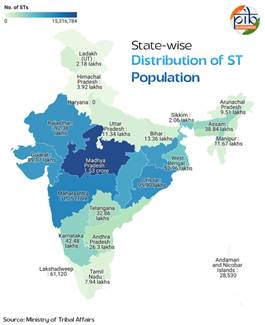
"Development should be all-round, development should be all-pervasive, development should be all-inclusive," Prime Minister Narendra Modi said during his Independence Day speech in 2021. "Be it our coastal belt or the tribal region, these regions are going to turn into a major foundation for India's development in future."
A month later, in September 2024, the Union Cabinet approved the Pradhan Mantri Janjatiya Unnat Gram Abhiyan (PM JUGA) for the socio-economic development of Scheduled Tribes in India.Also known as the Dharti Aaba Janjatiya Gram Utkarsh Abhiyan, PM JUGA aims to benefit more than 5 crore tribal people—about half of India's tribal population—through comprehensive development initiatives. It is the largest tribal development program in India’s history.
Tribal Village Development Mission
Seventeen-line ministries are collaborating on PM JUGA. These ministries are implementing flagship schemes to bridge critical gaps in social infrastructure, healthcare, education and livelihoods in tribal-majority villages and Aspirational Districts.
The scheme covers tribal-majority villages (with a population of 500 or more, and at least 50% tribal residents as well as villages in Aspirational Districts with a tribal population of 50 or more).
The scheme has a budget of Rs. 79,156 crores, with the union government contributing Rs. 56,333 crores and state governments Rs. 22,823 crores. It aims to develop over 63,000 tribal-majority villages in remote and hard-to-reach areas in 549 districts, which covers about 71% of India’s districts.
The ministries that are implementing their flagship schemes are as follows:
Table 1 - PM JUGA Sector-wise Targets and Budget Allocation
|
Sector
|
Target
|
Scheme Name
|
State & Central Funding Share (₹ Cr)

|
|
Housing
Ministry of Rural Development
|
20 lakh pucca houses
|
PM Awas Yojana Gramin
|

|
|
Roads
Ministry of Rural Development
|
25,000 km of roads
|
PM Gram Sadak Yojana
|

|
|
Tribal Development
Ministry of Tribal Affairs
|
Tribal marketing centres, upgrading tribal schools and hostels, setting up sickle cell disease treatment centres, strengthening Forest Rights Act, and providing incentive funds for top-performing tribal districts
|
PM Adi Adarsh Gram Yojana
|

|
|
Education
Department of School Education and Literacy
|
1,000 hostels for tribal children's education; upgrading Ashram schools, hostels and government tribal residential schools
|
Samagra Shiksha
|

|
|
Agriculture
Department of Agriculture and Farmers Welfare
|
Promoting sustainable farming practices for Forest Rights Act permit holders to cultivate forest lands and enable collective forest management
|
DoAFW schemes for FRA states
|

|
|
Primary Healthcare
Ministry of Health and Family Welfare
|
1,000 mobile medical units to provide primary healthcare in remote and difficult-to-reach tribal areas
|
PM Ayushman Bharat Health Infrastructure Mission
|

|
|
Electricity
Ministry of Power
|
Electricity connections to approximately 2.35 lakh unconnected households
|
Revamped Distribution Sector Scheme
|

|
|
LPG
Ministry of Petroleum and Natural Gas
|
Liquified petroleum gas connections to 25 lakh tribal households
|
PM Ujjwala Yojana
|

|
|
Connectivity
Department of Telecommunications
|
High-speed broadband connectivity to 5,000 tribal villages
|
Universal Service Obligation Fund/Bharat Net
|

|
|
Solar Power
Ministry of New and Renewable Energy
|
Solar power systems for households in areas without grid electricity access
|
New Solar Power Scheme PM Surya
|

|
|
Fisheries
Department of Fisheries
|
Fish culture support to 10,000 tribal community groups and 1 lakh individual beneficiaries
|
PM Matsya Sampada Yojana
|

|
|
Nutrition
Ministry of Women and Child Development
|
8,000 enhanced Anganwadi centres—2,000 newly constructed and 6,000 upgraded existing centers—to provide improved childcare, nutrition and early education services in tribal villages
|
Poshan Abhiyan
|

|
|
Digital Services
Ministry of Electronics and Information Technology
|
Digital services including Aadhaar, Unified Payments Interface, DigiLocker, etc.
|
Digital India Programme
|

|
|
Van Dhan Vikas Kendra Training
Ministry of Skill Development and Entrepreneurship
|
Training of Van Dhan Vikas Kendra centres (forest-based livelihood centres)
|
Jan Shikshan Sansthan
|

|
|
Skilling
Ministry of Skill Development and Entrepreneurship
|
Skilling centres in tribal districts for capacity building and business development of 1,000 VDVKs and other tribal groups
|
Jan Shikshan Sansthan
|

|
|
Livestock
Department of Animal Husbandry and Dairying
|
Livestock rearing support for 8,500 individual and group beneficiaries
|
National Livestock Mission
|

|
|
Tourism
Ministry of Tourism
|
1,000 tribal homestays to promote sustainable tourism and provide alternative livelihoods for tribal communities and funding homestay development
|
Swadesh Darshan
|

|
|
Nutrition Gardens
Ministry of AYUSH
|
700 Poshan Vatikas (nutrition gardens) to provide tribal communities with accessible fruits, vegetables, medicinal plants and herbs
|
National AYUSH Mission
|

|
|
Health Insurance
Ministry of Health and Family Welfare
|
Health insurance cards to eligible tribal households for government-funded healthcare
|
PM Jan Arogya Yojana
|

|
|
Water
Ministry of Jal Shakti
|
Water supply to every household in eligible villages and to 5,000 hamlets with 20 or fewer tribal households.
|
Jal Jeevan Mission
|

|
|
Governance
Ministry of Panchayati Raj
|
Capacity-building programs for all Gram Sabhas in tribal areas and training government officers, stakeholders to expedite pending FRA claims and strengthen forest rights processes
|
Rashtriya Gram Swaraj Abhiyan
|

|
|
Total
|
|
|

|
Table 2 - State-wise Funding for PM JUGA
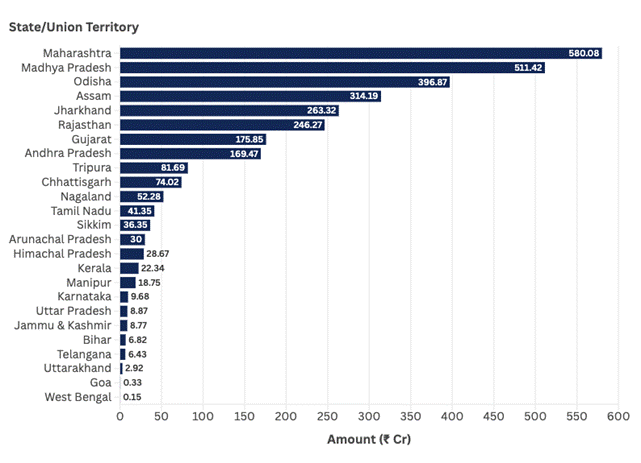
When Prime Minister Narendra Modi inaugurated PM JUGA from Hazaribagh in Jharkhand on October 2, 2024, he invoked Mahatma Gandhi's vision. "Gandhi ji believed that Bharat's development could only be achieved when the tribal community progressed rapidly," he said.
PM JUGA is rooted in Gandhian ideology. A year earlier, on November 15, 2023—celebrated as Janjatiya Gaurav Divas to commemorate tribal freedom fighter Birsa Munda's birth—the prime minister had launched the Pradhan Mantri Janjati Adivasi Nyaya Maha Abhiyan (PM JANMAN) for the holistic development of Particularly Vulnerable Tribal Groups (PVTGs).
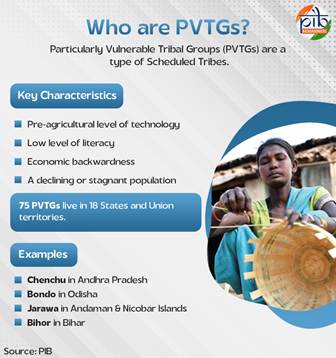
PM JUGA builds on the PM JANMAN scheme. While PM JANMAN focuses on improving living conditions for approximately 28 lakh individuals across 22,000 villages, the PM JUGA scheme has a broader mandate, targeting all Scheduled Tribes residing in tribal-majority villages and aspirational districts.
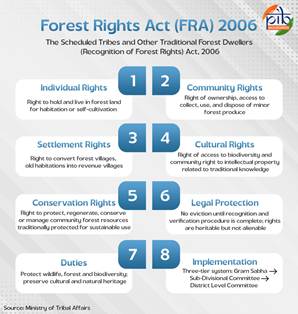
PM JUGA is aligned with the 2030 Agenda for Sustainable Development, demonstrating India's commitment to tribal development that contributes to poverty eradication, environmental protection and the promotion of the well-being of the communities. The goals recognize that ending poverty and other deprivations must go together with strategies that improve health and education, reduce inequality and spur economic growth – all while tackling climate change and working to preserve our oceans and forests.
SDG 3: Healthy Life and Dignified Ageing
Mobile Medical Units for primary health care in remote areas, Centre of Competence centres, Anganwadi centres, Poshan Vatikas
SDG 4: Universalisation of Access to Good Education
Hostels, ashrams, residential schools
SDG 8: Promotion of Economic Empowerment
Tribal Multipurpose Marketing Centres, tourist homestays, support for animal husbandry and pisciculture
SDG 9: Develop Enabling Infrastructure
Pucca houses, tap water supply, electricity, internet, LPG gas connections, roads, health insurance, primary healthcare centres, education, nutrition

Table 3 - PM JUGA Key Interventions & Progress Achieved as of June 14, 2025
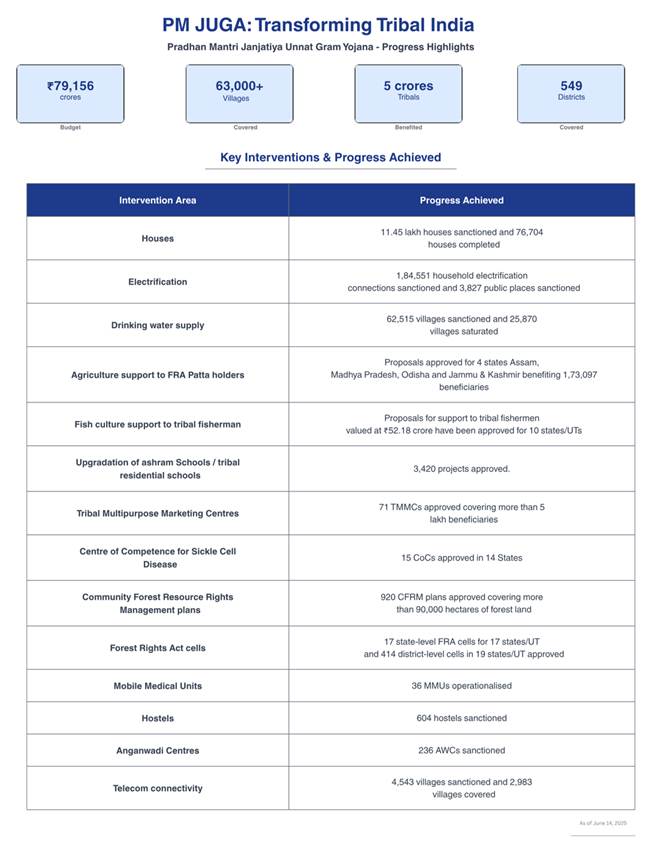

|
From Water Scarcity to Community Ownership: The Bairlutygudem Story
Bairlutygudem, a remote tribal village nestled in the forests of Andhra Pradesh's Nandyal district, exemplifies how government intervention can transform lives. Home to the Chenchus—a Particularly Vulnerable Tribal Group—and the Koya tribe, the village had long struggled with limited access to water and forest resources. For generations, women risked their lives walking through dangerous, wildlife-inhabited terrain to fetch water. Despite years of failed interventions, real change came only through the Jal Jeevan Mission.
Following this intervention, village women took leadership by forming a Village Water and Sanitation Committee, ensuring all 64 homes received tap connections. Trained local women now maintain water quality using Field Testing Kits, eliminating the dangerous daily treks through forests home to wildlife.
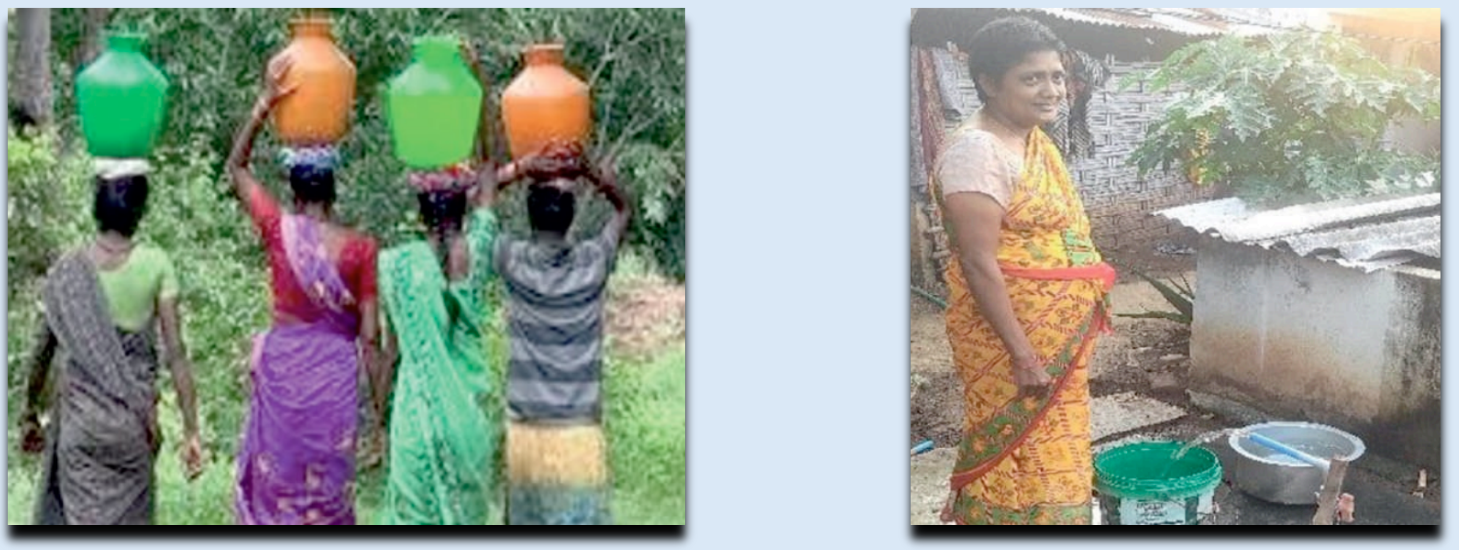
Photos (from left): Women walking miles to fetch water and a paradigm shift with JJM (Source: RWS&S department, Andhra Pradesh)
This transformation has fundamentally changed women's lives while establishing Bairlutygudem as a model of community ownership and sustainable development for other tribal villages to emulate.
As Prime Minister Modi emphasized during his Independence Day speech on August 15, 2024: "Our tribal population, though small, is scattered across remote locations throughout the country in tiny, isolated groups. The government is deeply committed to their well-being and development. Ensuring that government schemes reach every tribal family in remote villages, hills, and forests presents significant challenges, but we are determined to overcome every obstacle."
|
A Decade of Achievements
In February 2025 during Aadi Mahotsav, President of India Droupadi Murmu acknowledged the significant strides made over the past decade for tribal community development. She emphasized that "only when the tribal society progresses, our country will also progress in the true sense." This statement encapsulates the ministry's core philosophy of inclusive development.
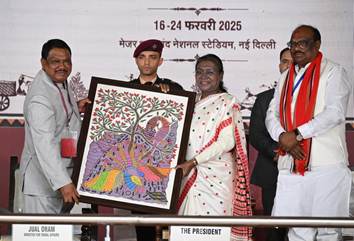
Figure 1: President of India Droupadi Murmu with Minister of Tribal Affairs Jual Oram at the Aadi Mahotsav in 2025, New Delhi
Inclusive development is the cornerstone of the ministry’s work. The ministry has also grown in scope and size to achieve it. From 2013-14 to 2025-26, the ministry’s budget has expanded by over 200% from Rs. 4,296 crores to Rs. 14,926, demonstrating the government's commitment to tribal welfare and embodying the vision of "Sabka Saath, Sabka Vikas, Sabka Vishwas, Sabka Prayas."
This increased investment is enabling the ministry to achieve the holistic development of marginalized tribal communities. The ministry has made significant progress in transforming tribal welfare through supporting NGOs, implementing the Forest Rights Act, 2006, supporting higher education for tribal children and youth, and celebrating and preserving tribal culture, among other initiatives.
Table 4 - Key Achievements of the Ministry of Tribal Affairs and Tribal Welfare Schemes
|
Scheme
|
Progress
|
|
PM Janjati Adivasi Nyaya Maha Abhiyan
|
1,88,696 pucca houses; 3,001.698 km connecting roads; 300 Mobile Medical Units; 2,92,941 piped water connections; 1,050 Anganwadi Centres; 100 functional hostels; 502 Van Dhan Vikas Kendras set up; 822 Multipurpose Centers; 1,24,016 electrified households; 227 mobile towers covering 559 villages; and 5,067 households sanctioned under New Solar Power Scheme as of March 31, 2024.
|
|
PM Adi Adarsh Gram Yojana
|
15,989 villages approved for Village Development Programs; ₹2,283.31 crores released as of March 31, 2024
|
|
Forest Rights Act
|
23.88 lakh individual titles distributed as of March 2025
|
|
NGO Support
|
185 NGOs, 310 projects, 9.35 lakh beneficiaries as of March 1, 2025
|
|
Development Action Plan for Scheduled Tribes
|
5x increase in allocation: ₹24,598 crores (2013-14) to ₹1.07 lakh crores (2023-24). Status: Rs. 127,434.2 crore allocated for Scheduled Tribe Component for 204 schemes July 21, 2025
|
|
Post Matric Scholarship
|
1.02 crore students benefited (2019-20 to 2024-25)
|
|
National Fellowship Scheme
|
0.16 lakh PhD scholars benefited (2019-18 to 2024-23); 78% increase in disbursements from ₹81 crores to ₹145 crores
|
|
Top Class Education Scheme
|
0.22 lakh students benefited (2019-18 to 2024-23); 402% increase in disbursements from ₹19 crores to ₹95 crores
|
|
Pre Matric Scholarship
|
54.41 lakh students benefited (2019-20 to 2024-25)
|
|
Eklavya Model Residential Schools (EMRS)
|
346 functional and completed schools, 138,336 students enrolled; ₹68,418 lakhs released; target: 722 schools
|
|
Van Dhan Vikas Kendra
|
Sanctioned 4,465 VDVKs across 29 states/UTs with 2,507 operational centers and ₹609.32 crores sanctioned as of February 2025
|
|
Tribal Cooperative Marketing Development Federation of India Ltd (TRIFED)
|
Expanded to 118 TRIBES INDIA outlets (99 own, 11 consignments, 8 franchisee) through 14 regional offices with 3,069 empaneled tribal suppliers as of 2023-24
|
|
National Scheduled Tribes Finance and Development Corporation (NSTFDC)
|
Sanctioned ₹383.18 crore financial assistance for 93,609 tribal beneficiaries and released ₹351.65 crore for scheme implementation as of March 31, 2024
|
|
Tribal Research Institute (TRI)
|
Sanctioned 9 new TRIs after 2014-15 (AP, UK, J&K, Sikkim, Nagaland, Mizoram, Meghalaya, Goa) with TRI Uttarakhand inaugurated in 2019 and TRI Andhra Pradesh on 15th August, 2021
|
Janjatiya Gaurav Divas: Celebrating Tribal Heritage
The Ministry of Tribal Affairs also works to preserve and promote tribal culture. Janjatiya Gaurav Divas is celebrated every November 15th on the birth anniversary of tribal freedom fighter Birsa Munda (1874-1900) to honour tribal communities' contributions to the freedom struggle.
The 2024 celebration marked the historical tribal leader’s 150th birth anniversary with unprecedented participation—over 1 crore people joined virtually, and the prime minister attended the main event in Jamui, Bihar. The government sanctioned 11 Tribal Freedom Fighter Museums across 10 states and organized more than 46,000 activities nationwide covering education, health, livelihood, and culture from November 15-26, 2024.
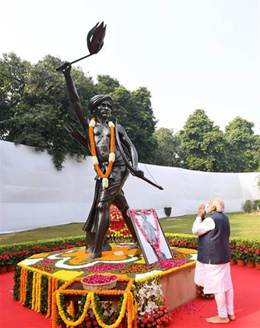
Figure 2: Prime Minister Modi gave a floral tribute at the statue of Birsa Munda in the Parliament Complex, New Delhi, November 15, 2021
Conclusion
India's tribal development initiatives have been transformed through coordinated approaches that have achieved unprecedented scale and impact. The changes include a more than 200% budget increase over the past 11 years, the launch of India's largest tribal village development program, PM JUGA, benefiting more than 5 crore, and successful implementation of the Forest Rights Act, scholarship schemes for tribal empowerment, among others. The tribal affairs ministry and other line ministries are bridging historical gaps.
References
Press Information Bureau:
- Cabinet approves Pradhan Mantri Janjatiya Unnat Gram Abhiyan: https://www.pib.gov.in/PressReleasePage.aspx?PRID=2055996#:~:text=79%2C156%20crore,Janjati%20Adivasi%20Nyaya%20Maha%20Abhiyan
- Ministry of Women and Child Development issues Guidelines of ‘Saksham Anganwadi and Poshan 2.0' - an Integrated Nutrition Support Programme: https://www.pib.gov.in/Pressreleaseshare.aspx?PRID=1847548
- “Poshan Vatikas or Nutri-gardens- a key plank of the Poshan Abhiyaan to enable the right kind of nourishment”: https://www.pib.gov.in/PressReleaseIframePage.aspx?PRID=1912577
- Poshan Vatikas or Nutri- gardens being set up across the country to provide easy and affordable access to fruits, vegetables, medicinal plants and herbs: https://www.pib.gov.in/Pressreleaseshare.aspx?PRID=1861686
- BharatNet: Extending Internet Access, Expanding Rural Progress - https://www.pib.gov.in/PressReleaseIframePage.aspx?PRID=2123137#:~:text=A:%20BharatNet%20is%20primarily%20funded,is%20executing%20the%20BharatNet%20project?
- Pradhan Mantri Adi Adarsh Gram Yojna aims at transforming villages with significant tribal population into model village: https://www.pib.gov.in/Pressreleaseshare.aspx?PRID=1882862
- PM launches Dharti Aaba Janjatiya Gram Utkarsh Abhiyan from Hazaribagh, Jharkhand on 2nd October 2024, birth anniversary of Mahatma Gandhi: https://www.pib.gov.in/PressReleasePage.aspx?PRID=2061196
- Janjatiya Gaurav Divas: Celebrating Tribal Heritage: https://www.pib.gov.in/PressReleasePage.aspx?PRID=2073246#:~:text=Along%20with%20the%20Dharti%20Aaba,Divas%20in%20Khunti%20District%2C%20Jharkhand
- From the Margins to the Mainstream: A New Dawn for India’s Tribal Communities – https://www.pib.gov.in/PressNoteDetails.aspx?id=154651&NoteId=154651&ModuleId=3
- The President of India Inaugurates Aadi Mahotsav – 2025: https://www.pib.gov.in/PressReleasePage.aspx?PRID=2103858
- Empowering Tribes Towards Viksit Bharat: A Historic Boost for Tribal Welfare in Union Budget 2025: https://www.pib.gov.in/PressReleasePage.aspx?PRID=2098853
- Prime Minister Shri Narendra Modi lays foundation stone of 50 new Eklavya Model Residential Schools on occasion of Janjatiya Gaurav Divas as part of Azadi ka Amrit Mahotsav: https://www.pib.gov.in/PressReleasePage.aspx?PRID=1772011
- Ministry of Tribal Affairs Bags Prestigious SKOCH Challenger Award for “Best Performance In E-Governance” & 3 Gold Awards for Its Initiatives: https://www.pib.gov.in/PressReleasePage.aspx?PRID=1689177
- M/o Tribal Affairs receives SKOCH Gold Award for its “Empowerment of Tribals through IT enabled Scholarship Schemes”: https://www.pib.gov.in/newsite/PrintRelease.aspx?relid=213355
- Ministry of Tribal Affairs bags Award of Appreciation in the 18th CSI SIG eGovernance Awards 2020: https://tritribal.gov.in/MediaCoverage/News/News_55.pdf
- M/o Tribal Affairs receives SKOCH Gold Award for its “Empowerment of Tribals through IT enabled Scholarship Schemes”: https://www.pib.gov.in/newsite/PrintRelease.aspx?relid=122325#:~:text=The%20capacity%20of%20tribal%20people,proper%20infrastructure%2C%20manpower%20and%20flexibility
- Year End Review 2022: Ministry of Tribal Affairs: https://www.pib.gov.in/PressReleasePage.aspx?PRID=1887716#:~:text=Scheduled%20Tribes%20(ST)%20constitute%20approximately,and%20culture%20as%20a%20priority
- India Celebrates Janjatiya Gaurav Divas: https://www.pib.gov.in/PressReleseDetailm.aspx?PRID=1772251
- The President of India Inaugurates Aadi Mahotsav – 2025: https://www.pib.gov.in/PressReleasePage.aspx?PRID=2103858
- Prime Minister Shri Narendra Modi marks the commencement of 150th Birth Anniversary Year celebration of Bhagwan Birsa Munda on the occasion of Janjatiya Gaurav Divas: https://www.pib.gov.in/PressReleseDetailm.aspx?PRID=2073608
- Tribal Affairs Minister Sh. Arjun Munda inaugurates New Building complex for the Tribal Cultural Research & Training Mission (TRI) , Andhra Pradesh as part of Azadi Ka Amrut Mahotsav: https://www.pib.gov.in/PressReleaseIframePage.aspx?PRID=1746152
Ministry of Tribal Affairs:
Others:
Click here to see PDF
***
SK/ RK
(Explainer ID: 154915)
आगंतुक पटल : 12022
Provide suggestions / comments